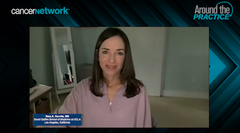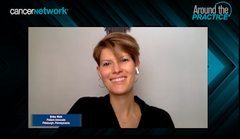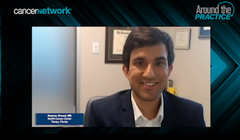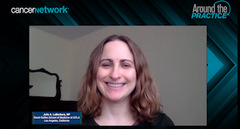
Pursuing a Second Opinion About HER2+ MBC Treatment
Erika Rich, a patient with HER2-positive metastatic breast cancer, explains why she opted to pursue a second opinion about her diagnosis and treatment options and proactively research her disease.
Episodes in this series

Sara A. Hurvitz, MD: Erika, I know that you initially mentioned earlier you saw a clinician for your diagnosis, and then you sought a second opinion. Can you take us through your thinking in terms of what prompted you to seek a medical second opinion, what sorts of questions you asked as a patient and what your thinking was at that time?
Erika Rich: It was definitely one of the scarier times because until you pick a doctor, you can’t start treatment. I was living in Nashville [Tennessee] and first got diagnosed out there. The doctor that I saw out in Nashville initially wanted to do surgery on my right hip as opposed to radiation. At the time, it was spring break so all of her front-runners that she would typically refer me out to were on vacation. It was at that point that my family that lived in Pittsburgh, Pennsylvania, took that as a chance to find me an oncologist here in Pittsburgh and come and meet with them. Whenever I met with them, I had a lot of questions about my treatment because the doctor initially in Nashville wanted me to do 4 different medicines and the surgery, which I was not a fan of. They took 1 of the chemotherapies out and I did the 1 chemotherapy and the 2 Herceptins [trastuzumab] was their initial plan. I became stuck in Pittsburgh, which made the decision easier. I passed out in my oncologist’s office whenever I was doing my second opinion. I didn’t have time to switch but we did get that initial conversation in before life went out for me. Whenever I did come back to, I was ready to be like, “OK, let’s start this.” They wanted to do radiation and look into that as opposed to a surgery and they took away 1 of the medicines. I felt confident in that and my family was also excited for me to be in Pittsburgh. I also made sure to do a lot of research on my oncologist and what his focus was. My oncologist was into research as well as presenting. I was interested in just the fact that he was on the forefront of everything that was going on.
Sara A. Hurvitz, MD: You bring up some good points, and clearly, you’re a good self-advocate in addition to being an advocate for others who have breast cancer. I congratulate you on that. That’s terrific. You brought up some good points. It’s not only your comfort level that’s important but your family’s comfort level. The patient is not just 1 person isolated on an island but has a group of people who care about them and it’s important to include them in decision makings. Second opinions are always the right answer. I encourage my own patients to get second opinions so that they’re comfortable with the treatment they’re pursuing. It sounds like your first oncologist was taking more of a curative intent approach with you rather than sort of seeing a 20,000-foot view in terms of the trajectory of your disease and how to treat it long term. You made some very good and educated decisions just by getting more information and looking into things.
Transcript edited for clarity.
Newsletter
Stay up to date on recent advances in the multidisciplinary approach to cancer.





































